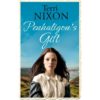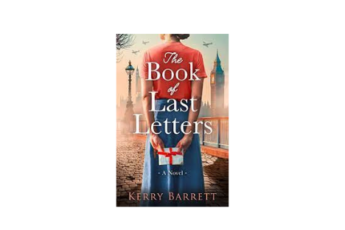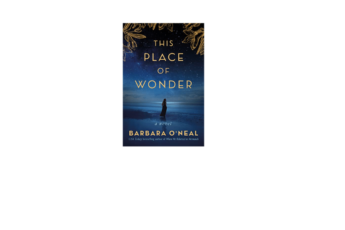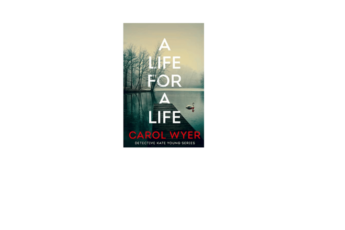Happy Valentine’s Day!
Today, The Blonde Plotters have met up with Anita Davison, author of, The Flora Maguire Mysteries, a series of five adventures of an Edwardian girl with a penchant for solving murders.

Thanks for popping by to visit us.
Please can you tell us a bit about the Flora Maguire stories?
Flora Maguire was raised in a Gloucestershire country house, the widowed daughter of the head butler. At eighteen she became governess to the family’s youngest child and only son, Edward and accompanied them to a family wedding in New York. She and Edward are sent home on the SS Minneapolis in order for Edward to attend school while his parents tour America. Flora is uneasy to find herself among exclusively first-class passengers, but when she meets a young man with the strange name of Bunny Harrington, she begins to enjoy the nine-day voyage on the luxurious ship.
During an early morning walk on deck, Flora discovers the body of a man who appears to have fallen down a companionway. His death is pronounced an accident but certain details don’t make sense to Flora, who starts asking questions. At first, she is dismissed as fanciful but with Bunny’s co-operation, she decides to find out what really happened to the dead man.
This was my first attempt at a cosy mystery and I intended it to be a standalone story, but once the first book was published, I received e-mails from readers asking me questions. For instance: What happened to Flora’s mother? Will Flora ever see Bunny again once they arrive in England? What happens to Edward as he grows up? etc.
My agent secured a contract for a series from Aria Fiction, an imprint of Head of Zeus Publishing. This gave me a route to follow as I compiled another four books, developing the character’s own stories alongside the ones which formed the mystery in each book.
In the first story, Flora was haunted by dreams about her mother who disappeared during Flora’s early childhood. I developed this thread in the next story where more is revealed about Flora’s past. The truth about what happened to Lily Maguire, and why, wasn’t fully explained until Book 4, giving closure for both the reader and Flora herself.
And the inspiration behind it?
When I first started writing, my stories were set in the 17th Century, which is an era which has always fascinated me. I soon discovered through low book sales and genre trends, historical fiction had become a niche within a niche, so if I wanted sell books, I had to choose a genre more popular with today’s readers.
I have always loved mysteries and wanted to use history as a backdrop for my stories as opposed to being the central focus. The Edwardian era was very much in vogue when I began writing the Flora books, so I set the first one in the early 1900’s and book five takes place in 1905.
Can you tell us a little about your route to publication?
I never aspired to
be a published writer, and I wasn’t surrounded by a
crowd of enthusiastic teachers and mentors who said I was a born author. One or
two did say I had a certain way with
words and I was always able to express myself better on paper than the spoken
word.
I should have asked those early voices why, or even how I could go about
becoming a writer. It might sound like a cop out to say, ‘no one showed me how
to do it’ but to me it seemed unattainable – something for cleverer, more
qualified people than me. I didn’t have much of a sense of self-worth so I
didn’t reach for the stars. The thought of ‘what if’ was always there, but I
had no idea how to turn it into reality.
This was in the pre-internet days when libraries were sanctums of yellow-paged
hardbacks and indexed file cards guarded by dour matrons who commanded silence
be maintained at all costs, especially against irritating questions from schoolgirls.
So where to start?
I began writing late, purely to please myself, but I was encouraged to join an
online critique group. It was there I discovered writing is a craft which
begins with some talent, true, but can be acquired by practice. Practice,
reading, editing and more practice.
The more I write, the more I realise there is so much more I don’t know about
writing – or even what good writing actually is. I have learned that it’s
unimportant how technically perfect you turn out a piece of prose; it’s about
how you communicate human feelings and experiences in a unique voice which resonates
with your readers.
My first full length novel was a
story about a 17th Century Exeter family caught up in the Monmouth
Rebellion inspired by Cynthia-Harrod Eagles’ Dynasty’ series. This story was my
first submission to publishers – and I didn’t bother with small presses
either – I aimed for two of the big five.
Strangely enough, an acquisitions editor replied, informing me that had I sent him the manuscript ten years before, he would have published it unquestionably [Yes, he did use that word] but – the market had changed and historical family sagas were no longer fashionable.
It was a lovely letter and this man still works in publishing – I wish I had taken more care of it as I lost it a while ago. He also told me that historical fiction still had a following so I must persevere. I did – mostly to prove I could produce an entire book, and this time submitted it to a small inde press, who published it in two volumes. At the time I was still naive enough to think a 250k word novel was the norm! I know better now.
After a brief flirtation with Victorian Gothic Romance, also published by an inde press, I was taken on by the Kate Nash Literary Agency who secured a contract for my historical biographical novel about the turbulent youth of Elizabeth Murray, Duchess of Lauderdale, who lived in Richmond during the English Civil War. I was still in my 17th Century phase then and although the book received a few good reviews, readership remained small.
What have you learnt that you wished you’d known when you started writing?
That where you begin a story is vital – setting the scene doesn’t work in modern fiction. The reader wants to be thrown into the story from the first page and descriptions and backstory should be sprinkled in as you go.
In my first Flora Maguire book, I gave one major character an upper-middle class nickname, mainly to distract Flora from his upper-class origins and give them a conversation piece. It seemed a good plot device at the time, but now I regret it. Some of my readers say it makes a serious character more endearing, while others find it puerile and annoying – but I’m stuck with it.
What would be your biggest tip for a new writer?
There is more than one route to publication, and many authors I know do well with self-publishing. However, I will never regret going the traditional route of finding an agent who had the courage to take me on as an unknown. When I doubted my ability, she didn’t and it took a few years, but she secured the contract for my series. Aria Fiction are a dedicated and professional company to work for and I am confident I could never have sold so many books without their editorial team, promotional efforts and support.
A little bit more about Anita
On a personal level – when people ask me what I do, the hardest thing for me to say is, ‘I’m an Author’. Strangers invariably ask if I am famous, have my own display in the local bookshop and do I often appear on TV talk shows?
To say my claim to fame is giving a talk at a Local Literature Festival doesn’t sound nearly impressive enough, however today’s writing community is vast and very different from the days when you could only hear about a book front a bookshop. The internet and social media has the ability to reach a far larger audience, and of course everyone can publish a book now – but don’t feel you’ll be lost in a sea of anonymity – there are far more writers like me than there are celebrity ones.
Book Blurb for Flora Maguire Mystery No 5 – The Bloomsbury Affair, published by Aria Fiction November 2018
1905 London is a heady mix of unimaginable wealth and simmering political tensions, and with war looming Flora Maguire wants to keep her family safe.
With her beloved charge Viscount Edward Trent suspected of murder, she’s determined not to leave the investigation to the police. Flora has trodden the path of amateur sleuth before, but with so much at stake, this time it’s personal.
Slowly the body of the victim found stabbed on a train bound for Paddington starts giving up its secrets, and Flora and her husband Bunny become mired in a murky world of spies, communists and fraudsters. And with the police more certain than ever that Edward is their murderer, Flora must work fast to keep him safe.
Links
Anita’s Amazon Author Page – https://www.amazon.co.uk/-/e/B01MQ1ODQM
Anita’s Website – www.anitadavison.co.uk
Facebook – https://www.facebook.com/anita.davison
Twitter – https://twitter.com/AnitaSDavison




